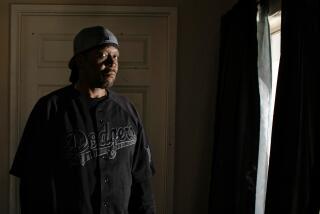Opinions on Suspect Run the Gamut
- Share via
For the last year, Michael Rahming waged an ongoing battle with his supervisors at Fairview Developmental Center, who he complained were harassing and tormenting him.
Amid the fray, he filed numerous grievances alleging racial discrimination and underwent a psychiatric evaluation, union and hospital officials say. Once, co-workers said, he went into a tirade in the paint shop break room.
Finally, according to police, he walked into the same room at Fairview and shot two of his bosses, one fatally, before heading across the sprawling institution to fire a bullet into the executive director.
What led to the tragic events was disputed Tuesday as detectives combed the hospital grounds and Rahming’s North Long Beach neighborhood. Union officials say the 37-year-old painter’s situation at work might have driven him into the desperate act, while hospital officials suggested the shooting might have been triggered by his own personal problems.
“They (his co-workers) did so many little things to pick at him,” said Gilda Garcia, a labor union officer who had worked with Rahming. “He wouldn’t even eat lunch with the rest of them. People would step on his toes or spit in his face, things where there wouldn’t be a witness. I was horrified at what was going on. They were definitely doing things to provoke him and set him up.”
Painters were expected to paint 700 square feet each day, Garcia said, but Rahming was given demanding tasks such as painting rooms with cracked walls or rooms in which he would have to move furniture by himself. Yet, she added, he was expected to complete the extra work on time.
Garcia, who began to weep when told about the shootings Tuesday, said she had feared that Rahming might become violent at work, but not shoot anyone.
Rahming was an extremely religious man who would not answer his phone on Sundays, she said. She quoted him as saying that he had severe ulcers from conflicts at work and that he would ask God to “help him control himself” over his treatment by his supervisors.
But ranking administrators at Fairview said Rahming caused his own unhappiness at work.
“He was very slow. He did not paint as much as the other painters did,” said Hal Britt, Fairview’s administrative services director. “He would walk off the job and disappear for long periods of time.”
Carole Hood, state deputy director in charge of developmental centers, said Rahming was a problem employee “almost immediately” after he started work there in October, 1988. He filed a host of grievances, was often absent and was surly and uncommunicative with co-workers and supervisors. Britt described Rahming as “paranoid” and suspicious.
Increasing problems led to a psychiatric evaluation, which found that Rahming suffered from depression, but he was cleared to keep working, hospital officials said, citing his personnel records.
Oddly, Rahming seemed to become much friendlier in the last few months, greeting people in the hallway, co-workers said.
“I thought he was a very nice guy,” said Terri Yates, assistant chief of central clinical services.
Before the shooting Tuesday morning, Yates said, Rahming had stopped by her office to ask how she was, knowing that she was scheduled to have surgery.
Back at his Long Beach apartment less than two hours after the shootings, Rahming, who lived alone, was soft-spoken and helpful to the Los Angeles County deputy sheriff who arrested him.
“He was one of the nicest suspects I’ve ever met,” said Nondice Mason. “He was very kind and friendly, totally cooperative.”
Similarly, those who live on Rahming’s modest North Long Beach street said Tuesday that he was a pleasant person who kept to himself, rising early to go to work.
At work, Judy McKenna, a Fairview office technician, described Rahming as “just real happy.”
A friend and co-worker of Rahming, who also requested anonymity, said Rahming was raised in tough neighborhoods of Compton and Long Beach and carried a pistol in the glove compartment of his truck.
“I talked to him all the time,” the friend said. “He isn’t a bad guy, but he thought he was being discriminated against by his bosses. I did not think he would ever do anything like this.”
Times staff writers Tammerlin Drummond and Sonni Efron contributed to this report.
More to Read
Sign up for Essential California
The most important California stories and recommendations in your inbox every morning.
You may occasionally receive promotional content from the Los Angeles Times.














